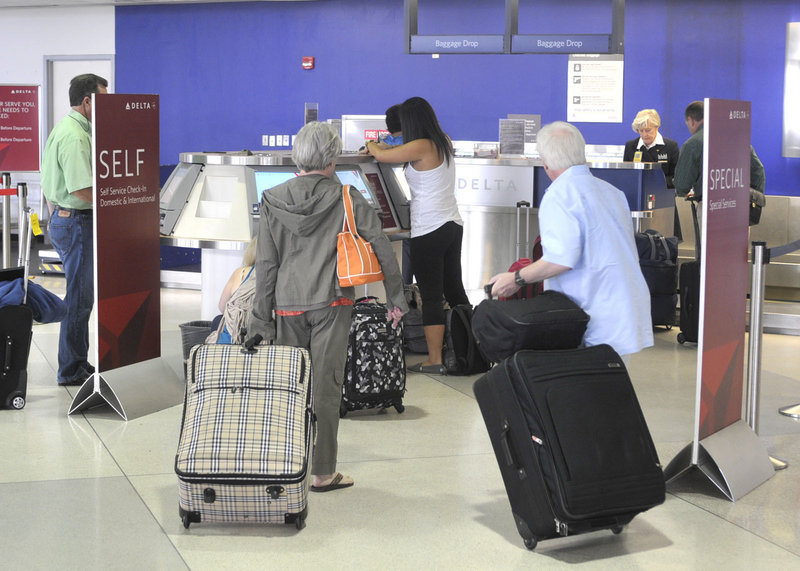ATLANTA – Although planes take off and land round-the-clock at this city’s bustling airfield, Paul Jacobson isn’t focused on flying, but rather on how much it costs to fly. As the senior vice president of finance for Delta Air Lines Inc., he must navigate volatile fuel costs, which he thinks oil speculators are driving to punishing levels.
During peacetime, Delta is the world’s largest consumer of jet fuel, edging out the Department of Defense. So even a small move in oil prices has an impact on the bottom line of a company that flies at least 700 of its own large and regional airplanes and counts more than 1,400 aircraft under its companywide umbrella.
Delta and the Air Transport Association, the lobby for airlines, have been out in front among 98 companies and trade groups that banded together to create the Stop Oil Speculation Now coalition.
It’s pushing for curbs on financial players in the oil markets, which they believe are pushing fuel prices high to profit from trading rather than from any need to consume fuel.
For most of the past 30 years, end-users of oil — such as airlines, oil refiners and trucking companies — dominated the futures market. They traditionally composed 70 percent of the market.
Today, that ratio has been flipped on its head: Financial players with no intent of ever using a barrel of oil make up 70 percent to 80 percent of the market in any given week.
Airlines argue that huge investment inflows from pension fund investors and Wall Street firms into the oil markets are driving volatility in world oil prices and distorting the price of crude oil and jet fuel.
Critics contend that the huge inflow of investment money into oil amounts to a self-fulfilling prophecy, with investors betting that prices in the future will go higher, thus driving them up.
Wall Street investment banks touted commodities over the last decade as a way to reduce risk and enhance earnings, since commodity prices often moved in the opposite direction of stock prices.
“Given how much trading there is today in commodities, it warrants as much attention and scrutiny as the stock market gets, and deserves some checks on the power of any individual player so as not to unduly influence” pricing in oil markets, said John Heimlich, the Air Transport Association’s chief economist.
Rising oil prices are out of sync with a weak U.S. economic recovery. Delta and its competitors, all job creators, struggle to remain profitable. The price of the jet fuel they need to fly Americans to and from destinations is as volatile as the prices motorists pay at the local gas pump.
“The way to think about that in our context is about $100 million to the bottom line; more profitability or less profitability, depending on which direction that shifts,” said Jacobson, who’s also Delta’s treasurer.
The airline consumes about 95 million barrels of jet fuel each week, or 4 billion gallons, annually. That’s enough to power a car that gets 25 mpg 100 billion miles — or more than 10 times the distance to the sun.
At any point in time, Delta is hedging about 50 percent of its fuel costs. It does so through purchasing contracts for future delivery of oil, called futures contracts.
It also does so by entering into private bets with Wall Street banks and other players in the unregulated over-the-counter market, sometimes called the swaps or derivatives market.
That’s why Delta and the Air Transport Association are aggressively pushing regulators to rein in financial speculation.
They want limits imposed on financial players across several oil-trading platforms, not just in the futures market.
And they want to return to a market in which some speculation is encouraged but not to the point that it crowds out users of oil.
Futures markets are designed to bring together buyers and sellers, and through a process called “price discovery” they reach rational, mutually acceptable prices for the underlying commodity, in this case crude oil.
Since 2000, and especially since 2007, big institutional investors such as pension funds and commodity-investment funds have flooded into the commodities markets, taking positions in everything from coffee to crude.
This has led some analysts to argue that these financial players distort the price discovery process in the futures market and raise the price of oil.
But Sarah Emerson, a Boston-based analyst for Energy Security Analysis Inc., disagrees.
“I think it is price discovery, but in a new and different world than we had 10 or 15 years ago. And it’s a world, unfortunately, that the airlines will have to cope with,” she said. “They consume a commodity that a lot of people want. It’s in every country, in every economy, and it’s subject to production problems. I would argue that price discovery is better than it ever was.”
Emerson thinks that oil was priced too low for too long, and that traditional oil traders looked past real risks to global supply disruptions.
“The world is not perceived as safe as it used to be. Markets are all about perceptions,” she said.
But she agrees with airlines that speculation has raised the price of crude oil and that there needs to be greater transparency about trades to level the playing field.
Copy the Story Link
Send questions/comments to the editors.



Success. Please wait for the page to reload. If the page does not reload within 5 seconds, please refresh the page.
Enter your email and password to access comments.
Hi, to comment on stories you must . This profile is in addition to your subscription and website login.
Already have a commenting profile? .
Invalid username/password.
Please check your email to confirm and complete your registration.
Only subscribers are eligible to post comments. Please subscribe or login first for digital access. Here’s why.
Use the form below to reset your password. When you've submitted your account email, we will send an email with a reset code.